Senior Cat Health Problems and Concerns
Senior cat health problems are a major concern among a growing number of people with older felines at home. Let's look at several of the major medical problems that may develop in older cats. But first, how old is old?
When is my cat considered senior?
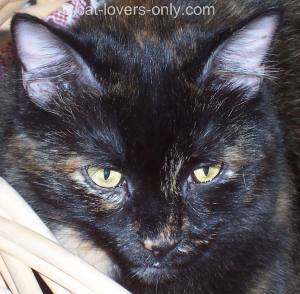
This is a question I hear asked a lot, and the consensus is that cats are considered to be senior at age 7 and above (although some charts show age 9).
While your cat may seem like a happy kitten at 7 years of age, she's actually getting old.
Many cats, however, can live happy and healthy lives past age 20.
A good environment, good food, exercise, and lots of attention can ensure that your cat has the best possible life. Here are some suggested tips on caring for your older cat.
Common Conditions
As cats age, they are subject to many of the same types of so-called age related ailments that we are. As cats live longer, they are more likely to experience age related medical problems including arthritis and mobility problems, hyperthyroidism, obesity, heart conditions, diabetes, and chronic kidney insufficiency.
Cats love warmth. Older cats tend to be more sensitive to cold and will often seek warmth more than when they were younger. They may also experience vision problems and hearing loss. They may sleep more as they age as well.
It's not often thought of as a senior cat health problem, but some older cats may go through behavior changes, perhaps due to medical issues. Changes in blood chemistry, hyperthyroidism, pain and discomfort, or a condition like dementia may be at fault.
If your cat can't see or hear as well as she should, she may be startled easily or seem uncoordinated. Dental problems may occur and can become quite serious if left untreated. Taking steps to ensure your cat's comfort as she ages is of primary concern, and you'll need to be understanding.
Products such as heated cat beds for warmth, litter boxes that accommodate mobility problems, and other items such as cat stairs or ramps to get around or get on the bed can help. If your cat has a loss of hearing, try not to sneak up on her. If her vision is getting poor, try not to rearrange the furniture too much.
Below we discuss some of the most common senior cat health problems.
Causes of Health Problems
In many cases, while we can often list the warning signs of cat illnesses, some of the underlying mechanisms and causes of disease are still as of yet unknown.
Many feline veterinarians are turning more and more to natural and alternative health remedies and practices. Some of these vets used to subscribe to the more traditional thinking of feeding commercial cat food, a full spread of vaccinations once a year, and accepting that along with aging comes disease.
In recent years, however, naturopathic and homeopathic veterinarians (or those leaning that direction) are saying that it's possible that diet (and what goes into commercial pet food), and environment are largely to blame for some of the more common senior cat health problems. Many years of poor diet and exposure to chemicals may result in disease in old age.
Environmental Factors
We keep our cats protected, and most of our pets live in the lap of luxury. They share our beds and our sofas, and they lounge around on soft carpeting, rugs, or pet beds. But, whatever chemicals are on our clothes, our furniture, our sheets, and our carpets ultimately end up in our cat's bodies.
Outdoor cats lie around in the pesticides that we spray on our lawns and shrubs. But, indoor cats may be exposed to as much or more of these chemicals.
If you walk on a lawn that's been treated with pesticides and then walk into your house, you can't help but spread those chemicals around right where your cat is going to be walking or resting. Cats don't wear shoes, and whatever gets on their paws and their fur ends up in their mouths when they groom.
Additionally, there have been some reports of testing that shows that cats are consuming large amounts of chemicals from the household. Most carpets, furniture, and other areas of the house are treated with stain resistant or flame retardant chemicals.
Many cleansers, and even fabric softeners and dryer sheets have cationic detergents which are toxic to cats. The effect of these chemicals on our cats is yet to be quantified.
Exercise and Diet
Many cats don't get enough exercise, leading to obesity. Indoor cats sometimes fall into a routine that includes little exercise and stimulation. This can lead to boredom and in some cases possibly mild depression, which leads to even lower levels of exercise.
Obesity puts stress on the heart and the joints and ties in with other issues such as diabetes. Many cats also don't drink enough water, placing them in a constant state of partial dehydration, which may lead to a host of health problems later in life.
In addition, a growing number of veterinarians and researchers are pointing to the diet of the average house cat as the root cause of many health problems as these animals age. Highly processed high carbohydrate/low protein foods are not your cat's natural diet. Cats don't eat cereal in the wild.
As an answer to this, some are proposing home cooked meals rather than commercial cat food products. Others are advocating a raw meat diet as the answer. Many veterinarians are simply turning to antioxidant and vitamin supplements, and some are recommending a combination of all of these things.
There are those who are proposing a vegetarian or vegan diet for cats as well. This is more often for ethical concerns, though, rather than the health of the cat. In other words, it serves the purposes of the owner, not the cat. While there are vegetarian recipe formulas available from some of the commercial pet food companies, this path is not without challenges.
Consider carefully the risks and responsibilities of using alternative diets for your cat. A couple of points about all this:
- Raw meat diets -- Before you run out and put your cat on a raw meat diet, you should consider the risks involved. These include increased exposure to foodborne illnesses including toxoplasmosis, as well as malnutrition from an imbalanced diet. Commercial cat foods that meet the AAFCO standards are heavily supplemented with nutrients. Wild cats and big cats in zoos and sanctuaries are fed meat with heavy doses of vitamin and nutrient supplements.
- Vegetarian or vegan diets -- Before you attempt switch your cat to a vegetarian or vegan diet, consider that this has extreme health risks to your cat.
The Animal Protection Institute and the American Society for the Prevention of Cruelty to Animals recommend against strict vegetarian diets for cats.
Cats are obligate carnivores and require animal protein in order to survive. There are also possible issues with urinary tract diseases when on these diets. - Exercise -- Before you let your fat cat outside to hunt, get exercise, and slim down, you should consider the risks of that as well. I hear people say that they believe their cats are happier outdoors.
Considering that the average lifespan of an outdoor cat is cut to fewer than 5 years, and many outdoor cats suffer from injury and illness at many times the rate of indoor cats, I just don't see it.
There are also environmental, legal, and community regulation reasons not to let your cat out. Here are some alternatives to letting your cat roam free:
Set up an outdoor enclosure, an indoor cat sanctuary, get a cat exercise wheel, and make sure you engage your cat in play with toys instead.
Obesity in Cats
Obesity in cats is running rampant. Over-fed and under-exercised, many cats are over weight. There may be several factors here at work, including the type of food we've been feeding our cats, and low activity levels. Top that off with table feeding which adds calories, and you've got a fat cat.
Vets and cat researchers are sending us a message. They're warning us that many commercial cat foods are not much more than processed grain with low quality meat products and vitamin supplements added in. Cats don't need cereal-based food, and certainly not low quality. You often can't buy the kind of food your cat needs to remain healthy into old age at the grocery store.
Switching your overweight cat to a homemade diet based on meat, or a premium cat food of the canned variety, plus some supplementation products can go a long way. Many people have reported not only a leaner cat, but also more alertness, brighter eyes, and reduced hair ball and constipation issues.
Long term feline constipation can lead to a serious bowel condition known as megacolon. Anything you can do to help reduce constipation (without causing other problems) is a plus.
Encourage your cat to exercise by providing the right toys and climbing areas. You should interact with your cat every day, even if it's only for a few minutes. A little daily exercise can do wonders for reducing weight.
Hyperthyroidism in Cats
Hyperthyroidism is one of the most diagnosed senior cat health conditions. It can often go along with a heart murmur and feline hypertrophic cardiomyopathy. In fact, Priscilla (shown above) was diagnosed with mild hyperthyroidism after her vet found a murmur, and eventually, cardiomyopathy.
Benign thyroid hyperplasia, as it's known, is believed to be caused by, you guessed it, environmental factors and possibly additives in commercial pet food. Research has shown that cats diagnosed with hyperthryoidism have high levels of chemicals that are known to be used as fire-retardants in carpets and fabrics. In addition, some veterinarians are pointing to supplemental iodine that is added to commercial pet food as a possible culprit.
Cats with this condition experience a variety of signs and symptoms, including unexplained weight loss, excessive thirst and urination, hyperactivity, and vomiting. Oddly, they may also be lethargic. Symptoms of this illness also include rapid heart rate, high blood pressure, and eventually, kidney failure.
Since it isn't known what triggers this disease, about the only thing you can do for prevention is to "go green" and start using environmentally safe and cat friendly household products.
Switch to natural flea killer and herbal flea treatments for your cat, catnip mosquito repellent for you, spice-based pest control, and "green" non-toxic cleansers.
The good news is that once diagnosed, this condition is often successfully treated with radioactive iodine therapy, which is about 95 percent effective.
Diabetes in Cats
Diabetes mellitus in cats is another near epidemic situation. High carbohydrate diets are being blamed, and lack of exercise doesn't help the situation.
In fact, many people with diabetes have gotten their condition under control by simply changing diet, exercising, and losing weight. Affected cats may be able to do the same.
Dr. Atkins and the folks promoting the South Beach Diet have touted the benefits of a low carbohydrate diet, including controlling diabetes in humans. These diets awakened us to the fact that it's not the butter that makes us gain weight, it's the potato.
Starchy or high sugar foods spike blood sugar levels, and cause the body to over produce insulin. This, in turn, causes the sugar to be stored as fat. It's also this process that taxes the system and leads to diabetes.
Cats, being obligate carnivores, are even more adversely affected by low protein/high carbohydrate diets. Cats need lots of protein, and have little use for carbs.
I outlined the symptoms of diabetes in cats here, but the classic signs are excessive thirst and urination. Over time, affected felines may lose weight, despite eating enough, and may be dehydrated, despite drinking large amounts of water. Their coats may become dry and dull as well.
A low carbohydrate diet can vastly improve the condition of some diabetic cats. With regular exercise and an improved diet, some cats will be able to do without insulin.
Chronic Renal Insufficiency
Chronic renal insufficiency (CRI) is fairly common in older cats, although young cats may have kidney problems as well. This condition is also referred to as chronic kidney insufficiency, chronic kidney failure, and chronic renal failure (CRF).
This site has a large amount of information on feline CRF.
Depending upon the severity of the disease, it may be manageable and affected kitties may live for many years after diagnosis.
Essentially, this disease is a progressive deterioration of the kidneys. The exact causes are unknown, but in some cases, genetics may play a part.
Certain cat breeds are more prone to developing this disease than others. The Maine Coon, Siamese and Balinese, Abyssinian, Russian Blue, Burmese, and Persians tend to have a higher incidence of problems.
The initial signs of this disease are similar to that of a number of other feline diseases, including diabetes and hyperthyroidism. Excessive thirst and urination, followed by weight loss, and vomiting.
A number of different therapies may be used to treat the disease and slow the progression. High blood pressure may be present and may also be a contributing factor to the development of the disease.
Low protein diets, recommended for older cats and cats with CRI, may actually make the disease worse. In fact, some veterinarians are again blaming poor quality cat food, with high carbohydrate and low protein ratios on causing this disease.
Health Supplements for Cats
To supplement or not to supplement, that is the question. A major senior cat health concern is reduced immune system function. Reduced immune system function makes your aging feline more susceptible to a host of ailments. Contagious diseases and infections are probably at the top of that list.
If you look at big cats and wild felines that live in zoos or are cared for by rescue organizations, you'll notice two things. First, these wild animals typically live a lot longer in captivity than their wild counterparts. Second, their diets largely consist of vitamin supplements wrapped in meat.
Many vets are recommending dietary supplements, not only for older cats but for domestic felines of any age, regardless of current diet. If you're feeding homemade cat food, or any non-AAFCO food, you'll definitely want to check with your vet on proper supplementation to meet your cat's nutritional needs. If you're feeding commercial cat food that meets the AAFCO requirements, you may also want to have a conversation with your vet about whether or not supplementation could enhance your furry friend's life.
While straight vitamin C supplementation may not be the best idea, there are other supplements for senior cats that many veterinary care experts are recommending.
Some of these, such as immune system boosters, directly address one of the major senior cat health concerns, and often provide additional protein, vitamins, and antioxidants for your cat.
There are a number of products that claim to boost the feline immune system, such as 4Life Transfer Factor Feline Complete.
Related Topics
Spotting the symptoms of cat illnesses and the signs of disease
Common cat health problems regardless of age
Got cat health questions? Exchange questions and answers with the Cat Lovers Only community
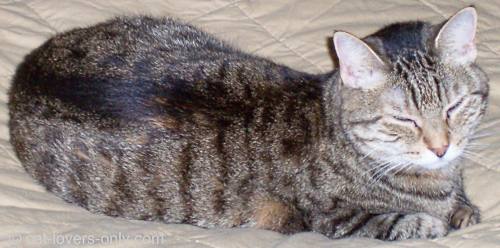
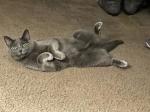
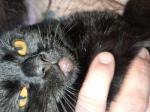
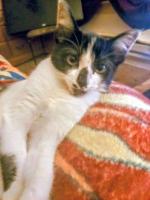
Comments: What do you think?
Have your say about what you just read. Leave me a comment in the box below.